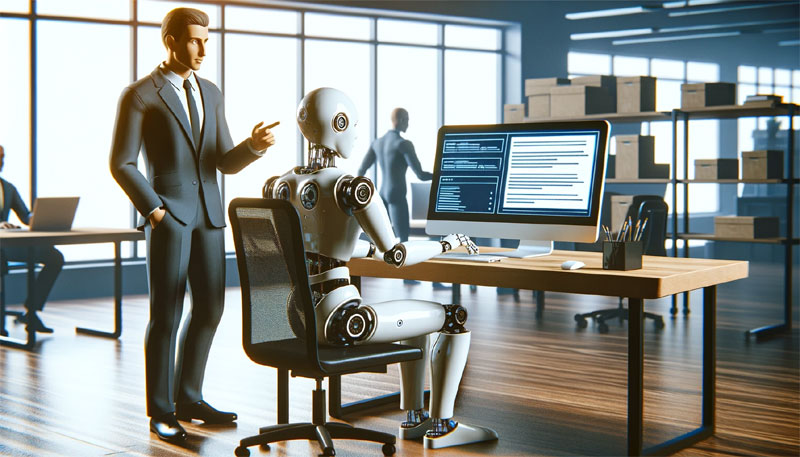by Francesco Marcolini | AxioWorks CEO, Software Architect and Developer///
In the annals of human progress, pivotal inventions such as the steam engine, the tractor, and the internet have revolutionarily altered our way of living and working. Today, we stand at the brink of another such transformative era with the advent of Artificial Intelligence (AI). The widespread apprehension that AI will render human jobs obsolete is a natural reaction to change, but history suggests a different outcome: rather than eliminating jobs, technological advancements often shift the nature of work, creating new opportunities and demanding adaptation.
AI’s integration into the workforce does not spell doom; instead, it heralds an era where human intellect and experience collaborate with machine efficiency. This synergy is crucial across various professions, where AI is seen as a tool to enhance, not replace, human skills.
Content Writers: Partners in AI-Assisted Creativity
For content writers, AI is less a competitor and more a collaborator. The emergence of AI tools in writing doesn’t diminish the value of a professional writer; rather, it augments their capabilities. Writers can input their intuition, experience, and unique style into AI systems to produce content that is not only efficient and cost-effective but also maintains a human touch. This symbiosis allows writers to focus on more creative aspects, like narrative and emotional resonance, leaving the repetitive tasks to AI.
Software Developers: Architects of a New Digital World
Software development is another field undergoing a paradigm shift. AI can speed up coding processes and manage routine tasks, but the role of a developer evolves from coding to conceptualising. Experienced developers will find their expertise more crucial than ever in designing software architecture and systems. They must guide the AI, ensuring that the software developed is not only functional but also aligns with broader business goals and user needs.
Legal Professionals: Navigators of AI-Assisted Law
The legal profession offers a compelling example of AI’s role as an assistant rather than a replacement. While AI can efficiently parse through complex contracts and legal documents, the expertise of a lawyer remains indispensable. Lawyers will leverage AI to handle voluminous data, but their critical thinking and judgement will be essential in interpreting the law and providing nuanced advice. The lawyer’s role becomes more strategic, focusing on oversight and the application of their hard-earned wisdom.
A Broader Perspective: AI as a Catalyst for New Specialisations
As AI takes over manual, repetitive, or tedious tasks, it compels professionals to step up their game, focusing on aspects of work that require human intuition, creativity, and emotional intelligence. This shift will likely lead to the emergence of new job roles and specialisations that blend AI capabilities with human skills. We will see roles centred around AI management, ethical application, and integration into various business processes.
Historical Parallels: Learning from the Past
Historically, major technological breakthroughs have always been met with trepidation, only to lead to more advanced and varied job markets. The introduction of the steam engine, for example, led to a drastic change in transportation and industry, creating numerous new professions. Similarly, the advent of the computer and the internet transformed workplaces, demanding new skill sets and creating roles that were previously inconceivable.
In each of these instances, humanity didn’t become redundant; instead, we adapted, learning to work with these new tools and even depending on them to expand our capabilities. The rise of AI is no different. It’s not about machines taking over but about humans working in tandem with machines to achieve greater efficiency and innovation.
Conclusion: Embracing Change and Opportunity
As we move forward into the AI era, it is crucial to approach this transition with a mindset of adaptation and lifelong learning. Those who view AI as a partner rather than a threat will find themselves in a world brimming with new opportunities. The key to thriving in this new age lies in leveraging AI to enhance our unique human capabilities, staying ahead through continuous learning and adaptation.
Therefore, rather than despair at the rise of AI, we should view it as an impetus to upskill and innovate. The future belongs to those who can merge their human ingenuity with the computational power of AI, creating a symbiotic workforce that is more capable than ever. In this future, AI doesn’t make us redundant; it propels us to new heights of creativity and efficiency.
